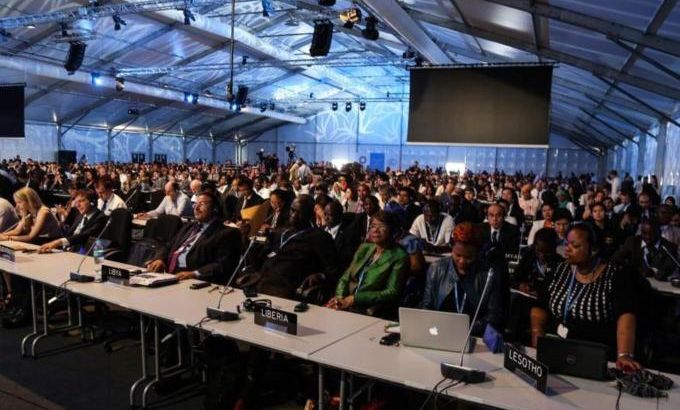Peru climate talks await breakthrough
Negotiators battle to emerge with an all encompassing climate deal in capital Lima as meetings head into a 13th day.

Negotiations on forging a UN pact to fight climate change have headed into an unscheduled 13th day in a frantic quest to bridge a rift between rich and poor countries.
The talks in Lima had been scheduled to end at 6:00pm local time on Friday, but ran into the pre-dawn hours of Saturday as countries traded over elements of a draft text.
Exhausted delegates were then given the chance of a few hours’ sleep before a meeting at 1500 GMT on Saturday to sound out opinion in a working group tasked with finalising the big document.
On the table is a text for shaping a worldwide accord to roll back carbon pollution which is now on track to ravage Earth’s climate system.
Theoretically to be sealed in Paris in December 2015 and to take effect by 2020, the deal would for the first time bring all members of the UN Framework Convention on Climate Change (UNFCCC) into a single arena for cutting greenhouse gases.
Its objective would be to ratchet down annual gas emissions so that global warming, driving climate shift, would never exceed two degrees celsius over pre-industrial levels.
But the talks in the Peruvian capital to pave the way to this historic agreement have run into a familiar problem – finger-pointing about which countries should do the heavy lifting.
#COP20 President @manupulgarvidal to delegates: "Make Lima a stepping stone, a tipping point, a crucial moment" pic.twitter.com/s3Z3OhPNSk
— UN Climate Change (@UNFCCC) December 13, 2014
The source of this lies in a principle of burden-sharing, enshrined in the UNFCCC’s charter in 1992.
The greatest friction has been over what to include in the core of the pact: national pledges for curbing Earth-warming fossil fuel emissions.
Developing nations insist Western economies bear the bigger burden because they were the first to use polluting fossil fuels to power their way to prosperity.
Industrialised countries retort that rich and poor countries are now at historical parity in their respective contributions to the carbon problem.
The big source of tomorrow will be developing giants like China and India, which are voraciously burning coal, the dirtiest fossil fuel, to power their rapid growth, they say.
Campaigners in Lima lashed the proposed compromise as wishy-washy.
“The latest text released during the night was left completely bare,” lamented Mohamed Adow of Christian Aid.
If approved, it meant “almost no progress would be made at Lima and all the work punted down the road to be fought over next year in Paris.”
“There would be essentially no outcome for people and the planet. It would be the weakest of weak political statements,” said Asad Rehman of Friends of the Earth.